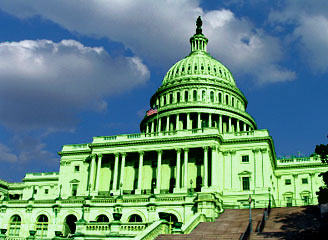Climate Politics
All Stories
-
WRI’s Pershing named deputy climate negotiator for Clinton
Dr. Jonathan Pershing became the new Deputy Special Envoy for Climate Change under Secretary of State Hillary Clinton this week. Pershing will work under U.S. Special Envoy for Climate Change Todd Stern, appointed by Clinton in January as Obama’s lead climate negotiator (see Secretary Clinton appoints special climate envoy Todd Stern warning, “the urgency of […]
-
A veritable flood of climate and energy bills in Congress
There’s been a deluge of bills on climate and energy introduced in Congress in the past few weeks. But the most notable news is that Congress is likely to omit a climate program from the budget resolution. President Obama’s budget proposal included a cap-and-trade plan to reduce greenhouse-gas emissions, but the House and Senate budget […]
-
Top Republican on House energy committee: “when it’s hot we get in the shade”
I don’t think most people appreciate the level of stupidity that people in Congress consume and pass on every day. Witness this, the opening statement of Joe Barton (R-Tx.) at a hearing today on climate adaptation. It begins with the immortal tautology: “Adapting is a common way for people to adapt to their environment.”
-
The New Yorker (!) parrots right-wing talking points on climate
[Please write an email to themail@newyorker.com about this outrageous piece and submit a question to author David Owen.] The New Yorker magazine has just published a lead story on climate, “Economy vs. Environment,” by David Owen, that is so bad, so filled with long-debunked right-wing talking points, it would barely qualify for the Wall Street […]
-
At prime time presser, Obama says an energy plan will pass
During his prime time press conference Tuesday evening, President Obama was put on the spot about Congress’ apparent unwillingness to go along with some of his budget proposals. The questioner listed a number of areas where Democrats on Capitol Hill may part ways, including the White House’s proposed cap-and-trade program to reduce carbon dioxide emissions. […]
-
EPA issues clarification on mountaintop removal notice
One can only wonder whether the following EPA statement regarding its move on mountaintop removal was prompted by some angry phone calls to the agency from certain influential West Virginia lawmakers. In any event, here’s what the EPA sent out late Tuesday: Following reports that mischaracterize actions taken by the U.S. Environmental Protection Agency (EPA), […]
-
Does Sen. Feinstein get global warming, desertification, and California’s looming demise?
Senator Dianne Feinstein (D-CA) appears to like deserts so much that she wants them to stretch from Oklahoma to California and cover one third the planet. The AP reported Friday, “Feinstein seeks [to] block solar power from desert land“: Nineteen companies have submitted applications to build solar or wind facilities on a parcel of 500,000 […]
-
Regional climate policy is still moving forward in the Northwest
Over the last couple of weeks, there’s been a lot of hand-wringing about the state of climate policy in the Northwest. Washington’s citizen-backed renewable energy standard is in jeopardy and neither Oregon nor Washington appears close to implementing the Western Climate Initiative. Even British Columbia’s pioneering carbon tax is taking fire. Freak out! Everybody panic! […]
-
Boucher bill would put billions into carbon-capture-and-sequestration technologies
Rep. Rick Boucher (D-Va.), one of the House’s biggest coal supporters, on Tuesday reintroduced a bill that would invest billions of dollars in the development of carbon-capture-and-sequestration (CCS) technology for fossil-fuel power plants. Like a similar measure Boucher introduced last year, the “Carbon Capture and Storage Early Deployment Act” would create a $1 billion annual […]
-
Newsom says San Francisco will adopt Berkeley green financing model
San Francisco mayor Gavin Newsom said something that caught my ear: San Francisco is going to adopt Berkeley’s innovative financing program to fund not only rooftop solar (as Berkeley does) but other distributed generation and energy efficiency projects. That is excellent stuff. Hopefully SF can pull it off successfully and influence other cities to follow […]


